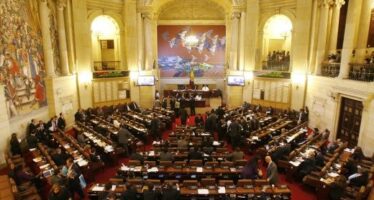Etxerat: che ritornino a casa (video)
![]()
750 prigionieri e prigioniere politiche basche detenuti in una ottantina di carceri dello stato spagnolo e francese. Centinaia di migliaia di chilometri ogni anno devono compiere i familiari ed amici per visitare i loro cari. 16 persone sono morte in questi ultimi 20 anni di estenuati viaggi dovuti alle politiche di dispersione attuate dal governo spagnolo. 16 milioni di ogni anno spesi per lottare contro l’isolamento e la volontà delle autorità spagnole e francesi di minare la coesione di un collettivo che rivendica diritti umani e politici stabiliti dalle convezione europee che i de stati hanno sottoscritto. Ma solidarietà continua, come testimonia la manifestazione di 40 mila persone a Bilbao il 2 gennaio scorso. Etxerat ha prodotto un video che è un messaggio di passione, d’amore e di denuncia. Perché il conflitto che ha provocato sofferenza da ambedue le parti ritrovi il dialogo come punto d’incontro.
Per vedere il video di Etxerat clicca qui
Related Articles
GERGER: MANO USA NELLA “TURCHIA SECONDO ERDOGAN”
![]()
Ankara. Haluk Gerger è docente di scienze politiche e scrittore. Lo incontriamo al termine del summit dello YAS (il consiglio
Special Jurisdiction for Peace Approved by Colombian Senate
![]()
Although reaching the quorum was difficult at the beginning of the session, finally the Special Jurisdiction for Peace (JEP) was
KURDISTAN SENZA TREGUA
![]()
 Torna sulle prime pagine dei giornali il conflitto kurdo-turco. I 26 (o 24 a seconda delle fonti) militari turchi morti in una serie di attacchi simultanei sferrati dai guerriglieri del PKK contro diversi obiettivi delle forze di sicurezza nella zona di Hakkari hanno fatto gridare a una nuova recrudescenza del conflitto. In realtà la guerra non è mai cessata, le operazioni dell’esercito turco non sono mai diminuite. Anzi, da agosto si susseguono bombardamenti in tutta la zona al confine con Iraq e Iran e spesso e volentieri gli F-16 turchi sono entrati nel Kurdistan iracheno colpendo non tanto o non solo le basi del PKK (il Partito dei Lavoratori del Kurdistan) ma soprattutto villaggi facendo molte vittime civili di cui nessuno parla.
Torna sulle prime pagine dei giornali il conflitto kurdo-turco. I 26 (o 24 a seconda delle fonti) militari turchi morti in una serie di attacchi simultanei sferrati dai guerriglieri del PKK contro diversi obiettivi delle forze di sicurezza nella zona di Hakkari hanno fatto gridare a una nuova recrudescenza del conflitto. In realtà la guerra non è mai cessata, le operazioni dell’esercito turco non sono mai diminuite. Anzi, da agosto si susseguono bombardamenti in tutta la zona al confine con Iraq e Iran e spesso e volentieri gli F-16 turchi sono entrati nel Kurdistan iracheno colpendo non tanto o non solo le basi del PKK (il Partito dei Lavoratori del Kurdistan) ma soprattutto villaggi facendo molte vittime civili di cui nessuno parla.
Gli attacchi di ieri hanno suscitato reazioni molto forti, comprensibilmente. A parte il presidente della repubblica, l’islamico Abdullah Gul, che ha promesso “vendetta” e altro sangue, è stato il BDP (Partito della Pace e Democrazia), cioè il partito dei kurdi a fare la prima dichiarazione. “Basta – si legge nel comunicato – con la guerra. E’ tempo che le armi tacciano e si realizzino le condizioni per favorire la pace”. Parole che il BDP va ripetendo da anni ormai. In questo sostenuto dal PKK che (è bene ricordarlo) ha osservato un cessate il fuoco unilaterale fino al 15 giugno di quest’anno. Cioè fino a dopo le elezioni politiche che hanno visto kurdi e sinistra turca eleggere ben 36 deputati al parlamento turco. Quello che è successo dopo questo risultato serve a contestualizzare anche l’attacco di ieri, al quale i turchi hanno risposto con una nuova offensiva aerea in nord Iraq.
Uno dei 36 deputati, Hatip Dicle (in carcere), è stato privato del suo mandato per un ‘reato’ (lui che era già stato deputato con Leyla Zana e aveva già fatto 10 anni di carcere) di natura ‘terroristica’. Cinque deputati sono attualmente in carcere. Al giuramento, dopo un boicottaggio durato tre mesi e mezzo, si sono presentati in 30. Da marzo a oggi sono finiti in carcere qualcosa come ottomila tra amministratori locali kurdi, attivisti per i diritti umani, militanti del BDP con l’accusa di essere in qualche modo legati al PKK. Dal 2009 (anno della vittoria dei kurdi alle amministrative) sono sotto processo oltre quattromila politici kurdi. Dal 27 luglio il presidente del PKK Abdullah Ocalan (in carcere dal 1999 sull’isola di Imrali) non può vedere i suoi avvocati. Un divieto imposto dopo che per mesi uomini del premier Recep Tayyip Erdogan hanno incontrato il leader kurdo per concordare “protocolli di pace” poi gettati nel cassetto.


